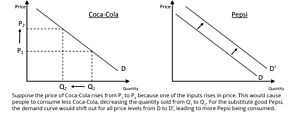Substitute good facts for kids
In economics, some things we buy are called "goods." Goods can be grouped based on how people buy them when prices change. They are either "substitutes" or "complementary goods."
Substitute goods are things you can use instead of each other. If the price of one goes up, people might buy more of the other instead. This means consumers will switch from the more expensive item to the cheaper one.
Contents
What Are Substitute Goods?
Imagine you want to spread something on your toast. You could use either margarine or butter. If the price of butter goes up a lot, you might decide to buy margarine instead. This makes margarine and butter "substitute goods."
Everyday Examples of Substitutes
Many things we use every day are substitutes.
- Tea and coffee are good examples. If coffee becomes very expensive, some people might drink more tea.
- You can also see this with different brands of the same product. If your favorite brand of cereal gets too pricey, you might buy a different brand that costs less.
Substitutes for Businesses
Substitute goods are not just for shoppers. Businesses also use them. For example, power plants can sometimes use either petroleum (oil) or natural gas to make electricity. If the price of oil goes up, they might switch to using more natural gas.
Why Substitutes Matter
When goods can be substituted, it means their demand is connected. If customers can easily switch from one product to another, companies have to be careful with their prices. If one company raises its prices too much, customers might just buy from a competitor. This helps keep prices fair for consumers.
Perfect vs. Imperfect Substitutes
Not all substitute goods are exactly the same. We can think of them in two ways:
Perfect Substitutes
Perfect substitutes are items that can replace each other completely. There is no real difference in cost or quality for the person using them. For example, two identical bottles of water from different stores might be perfect substitutes if their prices are the same. You wouldn't care which one you bought.
Imperfect Substitutes
Imperfect substitutes can replace each other, but there's a trade-off. This trade-off might be in price or in quality.
- Think about real leather and artificial leather. Artificial leather is much cheaper. It can be used in many products like bags or shoes.
- However, real leather often lasts longer and feels different. If these qualities are important to you, then artificial leather isn't a perfect replacement. This makes them imperfect substitutes. You have to decide if the lower price is worth the difference in quality.
See also
 In Spanish: Bien sustitutivo para niños
In Spanish: Bien sustitutivo para niños
 | Janet Taylor Pickett |
 | Synthia Saint James |
 | Howardena Pindell |
 | Faith Ringgold |


